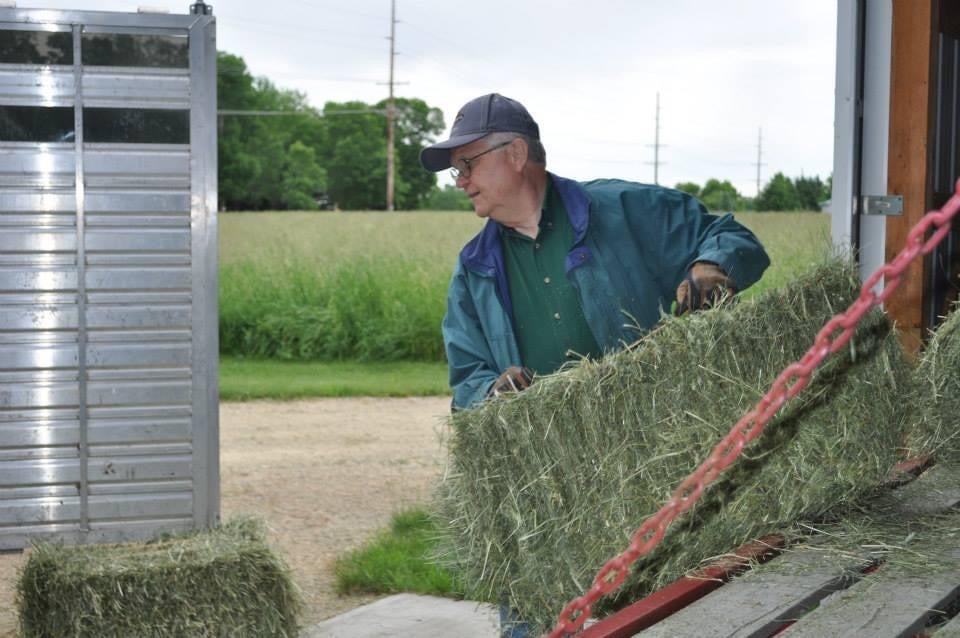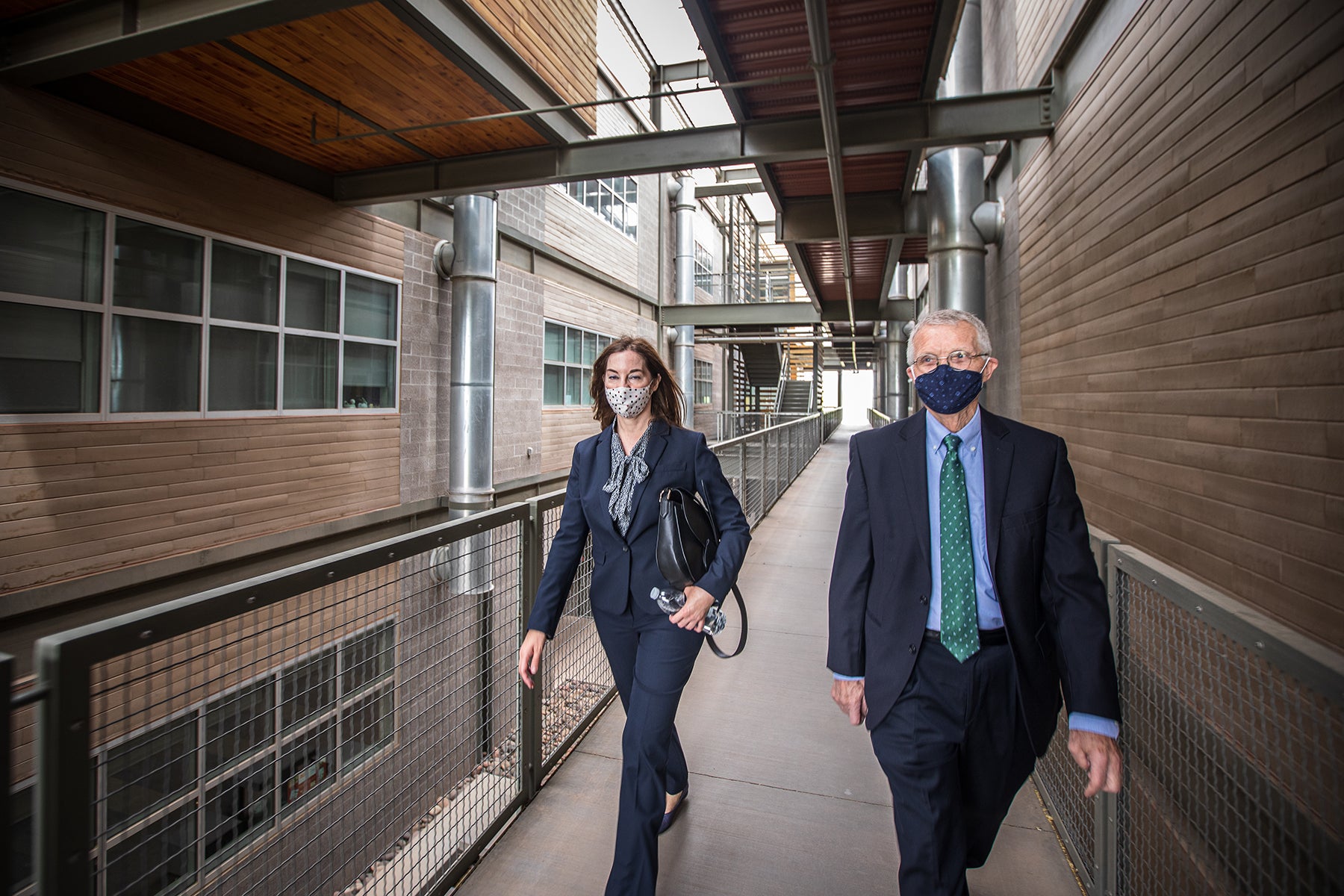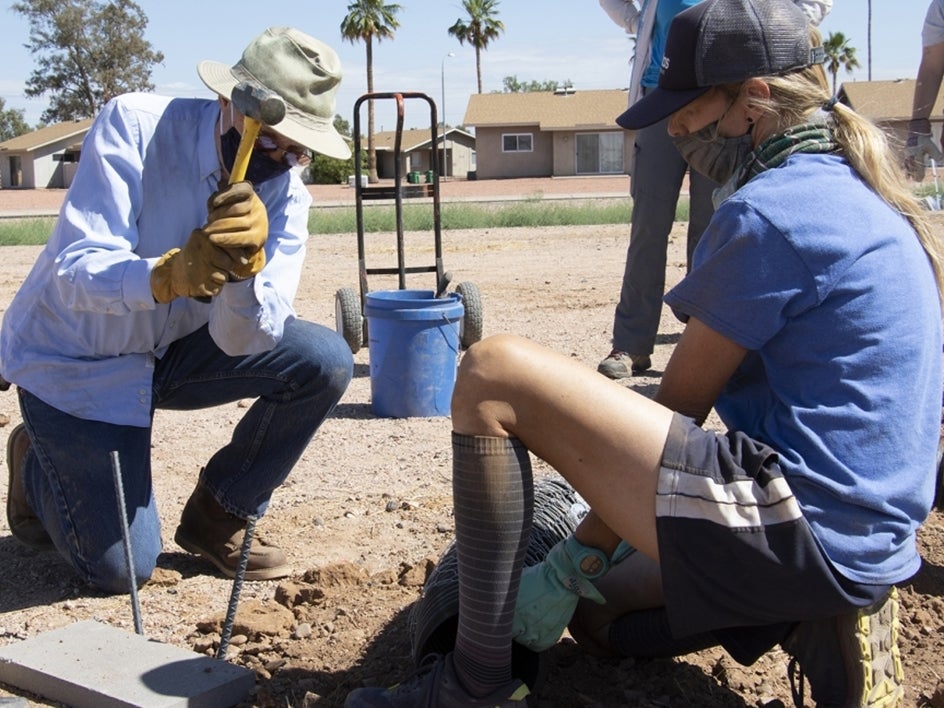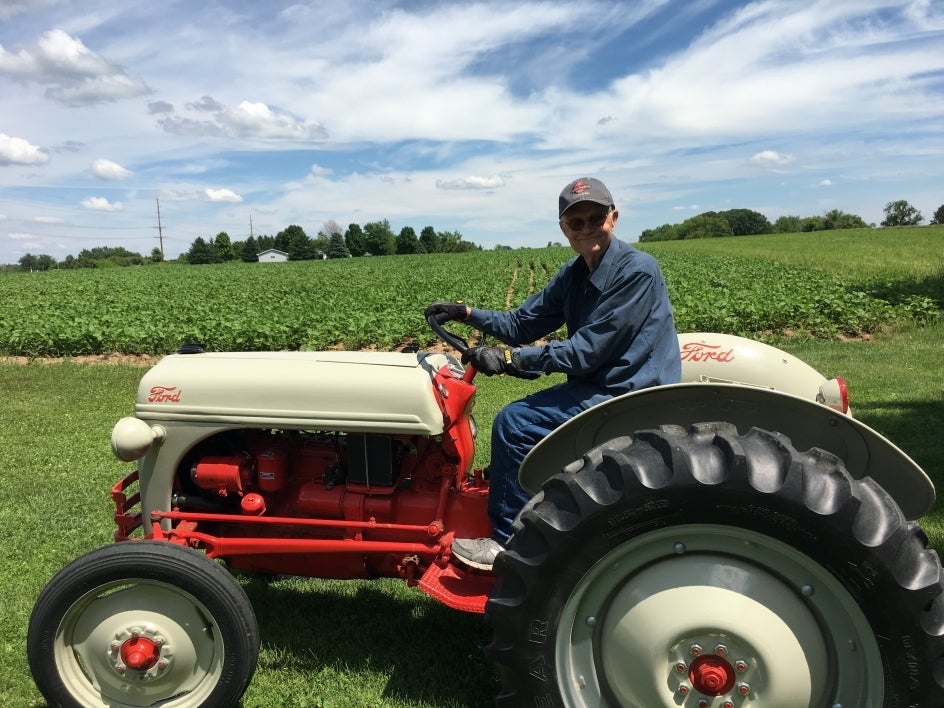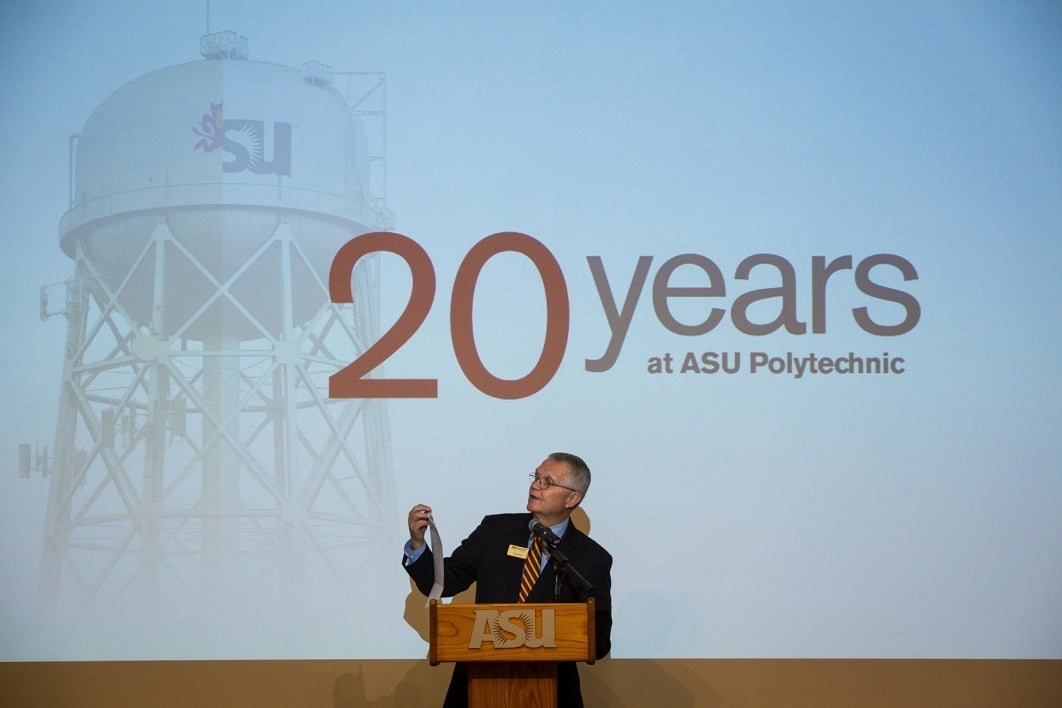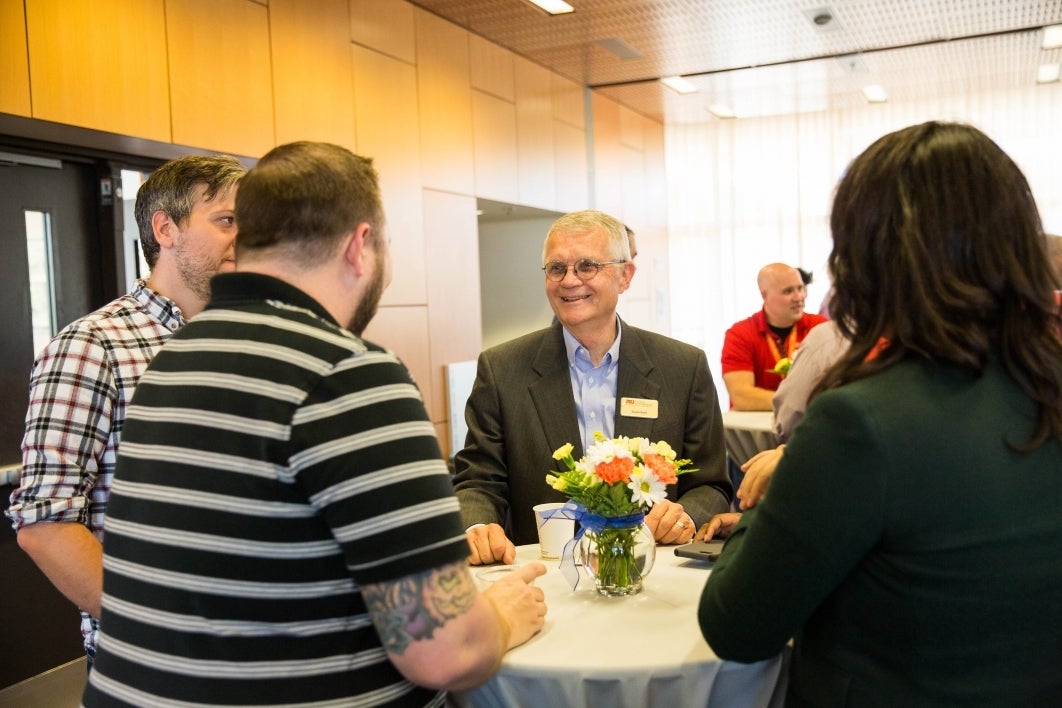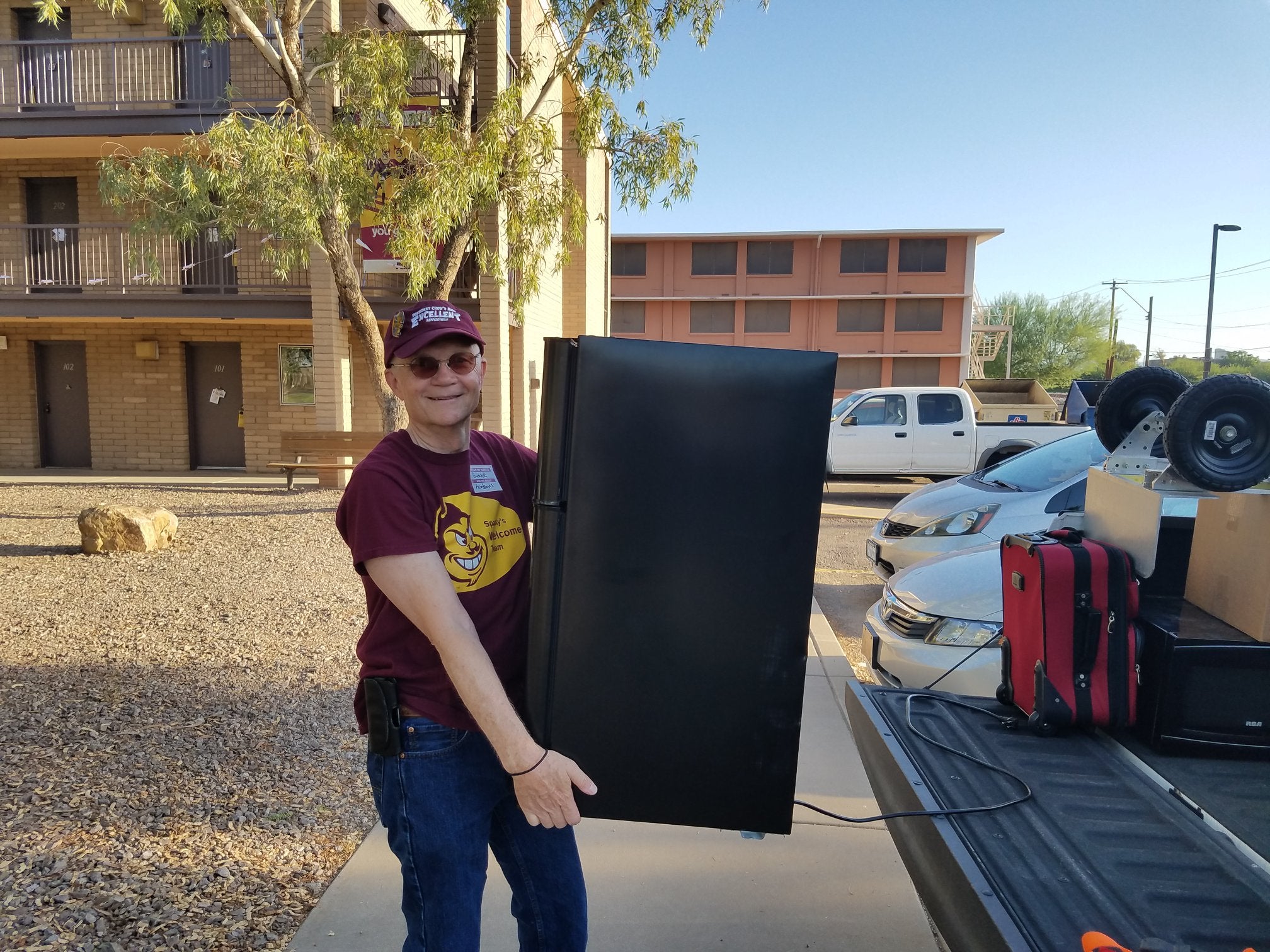Almost every morning Duane Roen walks to his office on Arizona State University’s Polytechnic campus about 6 a.m. It’s nice and cool, and he gets to talk to the facilities management folks who are out at that hour. Lovely people to talk with, he says. They work with their hands, and he loves working with his hands too.
“I get to learn so much from them along the way,” he says.
Roen is the vice provost of the Polytechnic campus and the dean of the College of Integrative Sciences and Arts. Rarely are calluses acquired in academic administration, but Roen brings some physicality to his roles.
Every semester on move-in day, he carries dorm fridges upstairs. Sometimes he has a competition with student workers to see who can carry up the most fridges. A month ago he was out in the heat helping to dig trenches and build habitats for burrowing owls on the edge of campus. One year he wore a tutu to the American Cancer Society’s Relay for Life.
Roen steps down at the end of this month from his administrative roles. He’ll keep teaching. It’s impossible to picture him standing still. The College of Integrative Sciences and Arts is spread across four campuses. When the Thunderbird School of Global Management was at its original campus, Roen once hit all five in one day.
His tours of the Polytechnic campus are legendary for their speed and thoroughness — even when it’s 110 degrees or above. You get in a golf cart with him, roar around at top speed, almost sprint through every building (where he can talk about the work that’s going on in every single room, in depth), and then zip around the empty lots where development is planned. It lasts not much more than an hour.
“That's something I learned when I was a kid growing up on a farm,” he says. “You get up early, you start working and you work a lot of hours. I don't think anything of it. That's just the way it is.”
From farm to classroom
Roen was one of four children who grew up on a dairy farm east of River Falls, in western Wisconsin. They had 60 head of cattle and milked 32. In those days that was enough to make a living.
Anyone who has ever worked on a farm knows what it entails: horticulture, animal husbandry, mechanical work, welding, carpentry, electrical work. There is always something to do. On a dairy farm you bring the cows in, milk them, take them back out, and then clean the shed and equipment. You do that twice a day.
During a trip to his brother Ron’s Wisconsin farm in 2018, Duane had a flashback to childhood memories of carrying bales of hay. Photo by Maureen Roen/ASU
“My wish is that every child in the world would have an opportunity to grow up on a farm,” Roen says. “You just learned so much about life, and you learn so many skills growing up on a farm. It's just the best experience ... and you learn good work habits. I was a pretty good employee by the time I was 6 years old.”
Like farmers all over the world, the Roens didn’t get to town much. He went to school in a one-room country schoolhouse. His father and grandfather had gone to the same school. Every day was like a family reunion. When he was in seventh grade, there were about 25 kids in the school. Half of them were named Roen.
He was interested in writing when he was very young. He still has pieces he wrote in second grade.
“The writing was just always fun to do,” he says. “It was a form of play, a form of exploration, a form of expressing ideas, a form of understanding ideas, you know. I've always kept that interest in writing.”
As a dean and professor he does a lot of writing, but he has written a lot more than typical administrative stuff — a dozen or so books and about 300 articles. In October 1978 when he and his wife, Maureen, had their first child, they began keeping a daily journal. They haven’t missed a day since. The journal is approaching 17,000 pages now.
“Writing is an addiction,” he says. “I cannot imagine going to sleep at night without writing in that journal.”
He assumed he’d be a dairy farmer. There was a college in River Falls, but he didn’t know it existed until he was in high school.
But when he was in eighth grade a fire destroyed the barn. A lot of the cattle died. Roen almost died too. His father decided to get out of farming and bought a Ford dealership. Roen worked in the shop and did some accounting and sales on the side.
That same year he had a language arts teacher named Joyce King, one of those teachers who changes a kid’s life.
“A lovely human being,” he calls her now. “And I thought every human being should be like Joyce King. And I wanted to be like Joyce King — the way she treated students, the way she encouraged learning, the way she nurtured people.”
Roen was always good at math and science, but his role models were all in letters. In college at University of Wisconsin – River Falls, he earned his bachelor's and master's degrees in English teaching. His mentor was English Professor Nicholas Karolides.
“He was such an influence on my life that we named our first child after him, so our son is Nicholas James Roen,” he says.
Roen began his career teaching English at New Richmond High School. He assumed he would do that for the rest of his life. But Karolides had such an influence on him that Roen went on to earn his PhD.
He taught at the University of Minnesota. He assumed he would do that for the rest of his life. But administrative jobs always fell into his lap. The pattern repeated itself wherever he went.
“I learned that you should lean towards saying yes when you're asked to take on a new responsibility,” Roen says. “Don't lean towards saying no. And it's going to be more work, more headaches probably, but you're going to learn more and you're going to grow as a person. So I'm so glad that I always said yes to opportunities when they came along, because it would have been easier to say no.”
At the University of Arizona, he had 12 appointments in a decade. At ASU he has had 14 roles in 26 years, not including being the founding coordinator of the Project for Writing and Recording Family History.
Nurturing a sense of community at Poly
At the Polytechnic campus, he helped plan new buildings for the College of Integrative Sciences and Arts. University planner Anne Gazzaniga worked with him as the campus grew.
“It was great to have a partner in Duane who always understands the needs of the faculty and students and balances those needs with larger campus initiatives,” she says. “I will miss be able to bounce ideas of him, talk through solutions and of course laughing about something silly.”
College of Integrative Sciences and Arts Dean Duane Roen leads the college’s incoming dean, Joanna Grabski, on a tour of buildings on the Polytechnic campus, some of which he helped design, on April 26. Photo by Charlie Leight/ASU News
Anna Wales works in business relations for the office of development at Polytechnic’s engineering school. The first time she worked with Roen was more than 20 years ago when she was doing a community outreach event for ASU Public Affairs. A group of people in the community wanted an ASU professor to speak to their group at 6 a.m. at a local restaurant.
“You can imagine how many faculty would not sign up for an event that starts at 5:30 a.m.!” she says. “I learned very quickly that Duane never sleeps. He met me at 5:30 a.m., and as usual he knocked it out of the park. Duane tells the best jokes — which are usually directed at himself! He had everyone in stitches, and they learned so much from his presentation.”
Roen and Wales have worked hundreds of events, tours and presentations through the years.
“He has a knack for bringing the best out of faculty, students and staff,” she says. “He rolls up his sleeves every time we move in new students on campus … lifting boxes, sweating and helping incoming families feel welcome. How could you not want to work harder with a leader like him?”
While the College of Integrative Sciences and Arts is spread out over four campuses, the Polytechnic campus is small — about 5,000 students. It’s quiet. Sighting quail and rabbits is not uncommon. The campus turns 25 this fall. The desert landscaping has matured. Arbors have filled in, and shade covers gravel pathways. It’s well thought-out. When ASU acquired it, it looked like what it was: an abandoned Air Force base with crackled parking lots and piles of dirt. Since then it has won design awards.
A lot of students from small towns like it because it’s not as busy as Tempe. Faculty like it because there’s a strong feeling of exploration and experimentation, throw-things-at-walls-and-see-what-sticks. “We do engineering a little differently down here,” one professor said a few years ago. And they do ASU a little differently too.
Roen is proud of helping to nurture a sense of community at Poly, which he is characteristically modest about.
“Obviously I'm not totally responsible for that,” he says. “There's so many people on the Polytechnic campus who are so committed to that sense of community. ...
“Last summer we didn't do it because of the pandemic, but we're starting to do it again now, and that is a weekly ice cream social in the summer for years and years and years dating back to the early years of the campus. Friday afternoon two o'clock ice cream social and everybody's there — faculty, staff, some students. ... It helps to reinforce that notion of community.”
This spring, alumna Meredith Rae Critchfield was promoted to dean of the College of Education at Grand Canyon University. She credits Roen, who served as her mentor through her graduation in 2012 and beyond.
“Every interaction with Duane is one full of grace, kindness and generosity,” she says. “He embodies what it means to be fair and good leader, and in every decision I make myself as a leader, I say, ‘What would Duane do? Now go do that.’ He’s a role model, a fantastic scholar and an even better human.”
Willingness to make things work
Another significant contribution Roen has made is the many ties the Polytechnic campus has to the local community, whether it’s business and economic development groups, local governments, schools, community colleges and chambers of commerce.
“I am so proud of that,” he says. “I think we've got really wonderful working relationships with the East Valley community, especially Mesa, Gilbert, and Queen Creek and Chandler. ... The attitude in the East Valley is summed up in this — and I didn't invent this — but if it isn't happening in the East Valley, it isn't happening. ... Everybody should have that attitude about their communities.”
Jon Schmitt works with civic leaders and community partners to advance ASU's mission in the East Valley. When he came on board, the thinking was to give Duane some support at Poly.
“Talk about an incredible individual, somebody who just does everything,” says Schmitt, assistant vice president for Educational Outreach and Student Services. “We'll miss him dearly. He's reminded us all he's not dying. ...
“If you want one great story, oh goodness. It was move-in one year and Duane's out there in his grubby clothes cause it's August and he's out there literally carrying students’ refrigerators up to their rooms. There's no ivory tower that academia gets accused of a lot. There is just none of that. There's a lot of farm boy from Wisconsin who just works tirelessly, but the (ASU) charter is emblazoned in his heart. He loves the institution and what it's about and has been just a tremendous ambassador for the university.”
Roen, Schmitt and Aric Bopp, who leads ASU’s economic development efforts with a focus on the university’s Innovation Zones, have spent hours scouting through empty buildings for places to house new companies.
“I guess for me the measure of Duane was always exemplified by his willingness to try to make things work at Poly,” Bopp says. “110 degrees, middle of the summer, he is out touring the Poly Innovation District. Really nothing stopped his desire to help move the Polytechnic campus forward, including a global pandemic.”
Off campus, people Roen has worked with in the community feel the same way. Amy Trethaway is director of education and workforce for the city of Mesa.
“Duane Roen is not just a sweet, personable and warm person,” she says. “He cares about students, colleagues and this community more than most people I know. He wins in this case; it’s a huge loss for us to let him go. Education in Mesa is better because of Duane, and we thank him with all of our hearts.”
The PHX East Valley Partnership was founded in the early 1980s by business, education, government and civic leaders to represent area interests. It’s an influential group. Roen took part in committee meetings and events.
“His positive demeanor about the many new projects and programs occurring throughout the region was infectious,” says Executive Vice President Mike Hutchinson. “He consistently looked for ways that the members of the ASU Poly faculty and staff could support new and existing businesses and was dedicated to taking steps to ensure student access to the East Valley business community. It is obvious to most that he is a very caring individual who is the first to share credit for successful ASU Poly activities with his associates and community partners. He will be missed!”
Sarah Watts is the Gilbert Chamber of Commerce president.
“He has time and again demonstrated his desire to provide world-class education to his students by finding solutions to the obstacles they face,” Watts says. “Duane knows the value of a strong, integrated community where all stakeholders work together toward the goal. And, notably, Duane never allows the prestige of his title to interfere with his ability to dig into the work. He is the first to roll up his sleeves and lead by hard-working example. I have long admired Duane the educator, but have held at even higher regard the heart and soul behind his work.”
Roen will miss some parts of being dean and vice provost. He will continue teaching — writing, of course — but also ASU 101, the course that instills the university’s mission and charter in all freshmen and teaches them how to be successful students.
“I'm still going to stay involved in some community activities in the East Valley,” he says. “I do a lot of teaching out in the community. I do a lot of family history writing workshops. I did one last night again, and I'll do more of them.”
Dean Duane Roen totes a refrigerator to a residence hall, something he does each move-in day. Photo by Maureen Roen/ASU
And in August he will once again carry refrigerators upstairs in the dead of summer. He’ll also pass that baton on to the new dean of CISA, Joanna Grabski, who he calls “a wonderful leader and an even more wonderful human being.”
“Joanna and I will encourage other CISA colleagues to join the team,” he said in a June email recruiting staff and leadership to help on move-in day in August. “Carrying refrigerators up the stairs has been a highlight for me each year. The only concern is that I have not gotten around to listing any of you as heirs in my will or beneficiaries in my life insurance policy.”
He will be missed as dean and vice provost. One of his longest associates said it best:
“When I think about our Sun Devil family – Duane Roen is at the center,” Wales says. “I hope he understands the impact he has had on so many of us, and we will work very hard to try to continue to build on the legacy he has created.”
Top photo: Dean Duane Roen recounts a discussion he held with a man who told him, "I am a student and a teacher of everyone I meet," at the College of Integrative Sciences and Arts convocation May 10, 2019, at Wells Fargo Arena. Photo by Charlie Leight/ASU News
More Arts, humanities and education

Pen Project helps unlock writing talent for incarcerated writers
It’s a typical Monday afternoon and Lance Graham is on his way to the Arizona State Prison in Goodyear.It’s a familiar scene. Graham has been in prison before.“I feel comfortable in prison because of…

Phoenix civil rights activists highlighted in ASU professor’s latest book
As Phoenix began to grow following WWII, residents from other parts of the country moving to the area often brought with them Jim Crow practices. Racism in the Valley abounded, and one family at…

Happy mistake: Computer error brings ASU Online, on-campus students together to break new ground in research
Every Thursday, a large group of students gathers in the Teotihuacan Research Laboratory (TeoLab) in the basement of the School of Human Evolution and Social Change building on Arizona…



